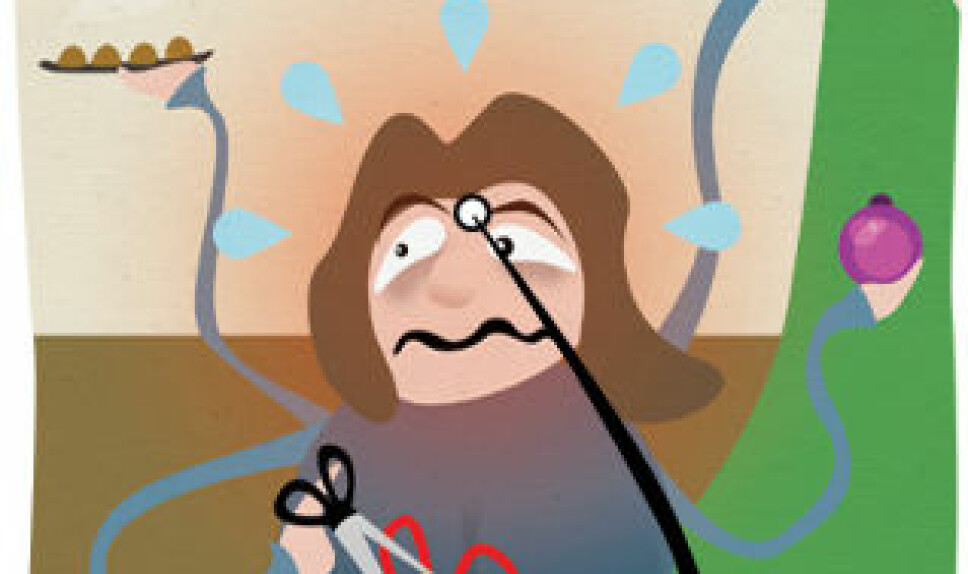
How stress affects conception
Stress can make it harder to conceive, but Christmas stress isn’t necessarily a crisis for would-be parents.
Denne artikkelen er over ti år gammel og kan inneholde utdatert informasjon.
If pregnancy tops the list of your Christmas wishes this year, you probably already know that not everyone finds it easy to get pregnant.

About 80 percent of women who attempt to get pregnant succeed within a year. Several factors, however, can influence conception, including stress, which can serve as involuntary birth control.
But what actually happens in the body when stress hampers pregnancy?
If you have sexual intercourse and sperm is sent up into your vagina, it’s not like they can turn around and high-tail it home. So when sperm first make their way to where they should meet an egg, and it's at the right time in the woman's cycle, it seems logical to assume that the egg will be fertilised. That's not always the case, though.
Hormone mix-up
“Stress can hamper ovulation. No amount of sperm will make a difference if the woman's body hasn't released an egg,” explains Tore Henriksen, a professor of obstetrics and gynaecology at the University of Oslo. Henriksen and works at the Women’s Clinic of Oslo University Hospital, Rikshospitalet.
The explanation of what happens in a woman's body when she is stressed begins in an organ the size of a chickpea on the lower side of our brain, the pituitary gland.
A woman's body is involved in a constant monthly dance of hormones, for which ovulation is the biological grand finale.
The pituitary gland has responsibility for ovulation.
The pituitary communicates with the ovaries by sending hormones through the bloodstream – first hormones that cause the egg to mature, and then hormones that trigger ovulation.
But when a woman is stressed, other hormones are released in the brain, which can bungle the hormone cycle.
Chain reaction
“Stress affects the brain in a number of regions, including sending signals to the hypothalamus, which is located right on top of the pituitary gland,” Professor Henriksen says.
The hypothalamus regulates the pituitary, so when stress interferes with the hypothalamus it is hindered from sending the right hormone messages to the pituitary, which in turn is kept from releasing the necessary hormones to the ovaries.
This chain reaction can thus prevent ovulation.
Without ovulation, any eager sperm that arrives on the scene will find no egg to fertilise.
Women can buy a variety of ovulation sticks or strips that determine if she is ovulating. But that is no guarantee if you are stressed, Henriksen says. Even if a test shows you are ovulating, it doesn’t mean you’ve dodged the stress bullet.
Less sperm
“It’s been discussed whether stress can provoke or facilitate an abortion. In other words, if stress can prevent a fertilised ovum from attaching to the uterine wall,” says Henriksen.
Researchers have seen it happen with animals, but Henriksen says this hasn’t been studied among human beings.
“The problem with research on stress is that it isn’t an unambiguous or quantifiable concept, so it’s hard to determine what discoveries have been made,” he explains.
Another debate concerns males – can stress affect their sperm production? The jury is still out on that too.
Henriksen mentions a more mundane factor that can impact harried, would-be parents:
“If the stress is caused by the couple being too busy, and thus they don’t have time to have sex during biological prime times, no pregnancy will result, even if everything else was just right.”
The impact of holiday season stress
You’ve got your Christmas shopping, Christmas foods and cookies, washing, tidying up, decorating and year-end work deadlines.
You can take your pick of stress factors in December – they’re as abundant as packages under the tree. But according to the professor, yuletide stress doesn’t necessarily throw a wrench in the hormonal works of the pituitary gland:
Stress comes in many different forms, so sometimes it needn’t pose a problem.
Work stress and holiday season stress aren’t necessarily negative if you are enjoying this spike in activities, he says.
“But if you are getting close to the age of 40 and thinking ‘Now I better get pregnant’, this is a wholly different kind of stress, and it’s the kind that can reduce your chances of becoming pregnant.”
Advice to stressed would-be parents
Henriksen can’t give a firm reply regarding how much your chances decrease if you are stressed, and he says it’s hard to make any statistical analysis when stress research is essentially so difficult:
“But we see pretty often that couples who haven’t been able to have children and who are placed on the waiting list for in vitro fertility treatment, successfully conceive while waiting their turn.”
The medical researcher thinks the phenomenon ties in with stress release, so he has some advice to couples who want to conceive and need to lower their stress levels.
“If the stress stems from something you have some control over, like your job or your family, you need to eliminate it.” That’s easier said than done, so the researcher also has some comforting advice:
“If the stress is from the fear of infertility, remember you can always seek help,” he says. “Medicine has made so much headway in this area that the majority of couples who have trouble conceiving can get the help they need.”
———————————
Read the Norwegian version of this article at forskning.no
Translated by: Glenn Ostling
































